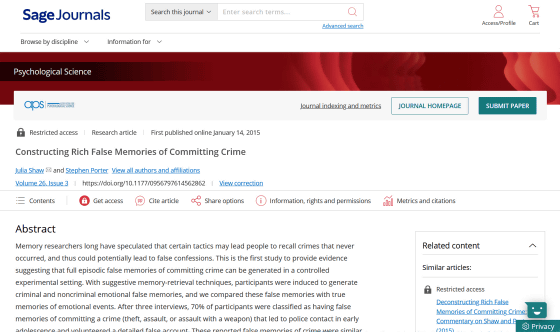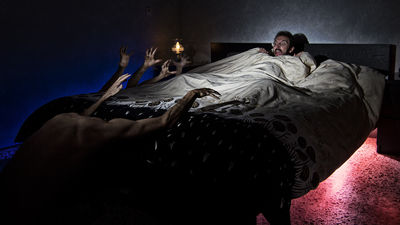Research results that humans believe that they have done ``a fictitious incident that did not occur in reality'' and confess

In criminal investigations, ``the criminal confessed himself'' is considered to be very strong evidence, but sometimes even an innocent person can endure harsh interrogation and confess, which may lead to false charges. It has been pointed out that there is In fact, past research has shown that subjects can be implanted with memories of ``fictional incidents that have not even occurred'' and be convinced that they are the culprits of those incidents.
Constructing Rich False Memories of Committing Crime - Julia Shaw, Stephen Porter, 2015

Suspects can confess to committing crimes they didn't do - research shows - beds.ac.uk | University of Bedfordshire
https://www.beds.ac.uk/news/2015/january/suspects-can-confess-to-committing-crimes-they-didnt-do-research-shows/
People can be convinced they committed a crime that never happened -- ScienceDaily
https://www.sciencedaily.com/releases/2015/01/150115102835.htm
TV dramas and novels often feature innocent people who say, 'I was forced to confess during police interrogation, and I said that I had committed a crime that I never did.' Even in real cases, there are cases in which a person who once pleaded guilty retracts his confession in court and is later acquitted because the legitimacy of the confession is not recognized, or the trial is ordered to be redone after the judgment.
Past research has shown that using a technique called `` lead interrogation '' that shows sympathy and understanding at the same time as cornering the suspect, he is made to confess that he made a mistake that he did not actually do.
Why do people confess that they have committed an innocent crime? -GIGAZINE

Also, in a study published in 2015 in the peer-reviewed journal Psychological Science , a research team led by Julia Shaw, who was a psychology lecturer at the University of Bedfordshire in England at the time, asked subjects to 'fake incidents.' We conducted an experiment to plant the memory of
In this experiment, the subject college students first answered a questionnaire about ``specific events they experienced between the ages of 11 and 14'' and shared the details of the event with the research team. The research team then conducted a total of three 40-minute interviews at weekly intervals to discuss two high-impact events that the subjects experienced during their teenage years.
Of the two events the research team discussed with the subjects, one was a 'actual event' based on a questionnaire, and the other was a 'fictitious event that did not actually occur.' The fictitious events are divided into crime-related events such as ``violence and theft that can be reported to the police'' and emotional events such as ``injury and loss of money'', and are based on real experiences and close friends answered by the subjects in the questionnaire. included the name of The research team also contacted the subject's parents and asked them to agree to ``do not discuss fictitious events even if asked by the subject.''

Subject was asked during the interview to elaborate on what happened during the two events. Of course, it would have been difficult to talk about a fictitious event, but the interviewer urged him to talk about something anyway and advised him on strategies to recall memories.
When asked to remember as much of each event as possible in the second and third interviews, 21 out of 30 (71%) who were given a memory of 'a fictitious event in which they committed a crime' Turns out I developed memories of crimes I never actually committed. Eleven of the 20 people who were implanted with memories of some sort of violent event reported 'accurate interactions with police' that were non-existent.
On the other hand, among subjects implanted with memories of noncriminal emotional events, 23 of 30 (76%) developed false memories. Subjects who developed memories of fictitious events reported similar levels of detail, both criminal and emotional, and reported similar levels of reliability and clarity in their false memories.

The research team speculates that by incorporating real-life friends and others into fictitious events, they were able to make the fictitious events seem real. “In such a situation, the inherently error-prone reconstructive memory process can quite easily generate false memories that are astonishingly realistic,” Shaw said. 'Some people were able to recall incredibly vivid details about crimes they had never committed.'
The results of this study show that many people are likely to confess to ``crimes that have not been committed'', and investigative agencies need to understand this point before conducting investigations. 'By demonstrating the harm caused by bad interrogation techniques known to produce false memories,' Shaw said, 'you can persuade interviewers to avoid them and use good techniques instead.' I will.”
Related Posts:
in Science, Posted by log1h_ik






